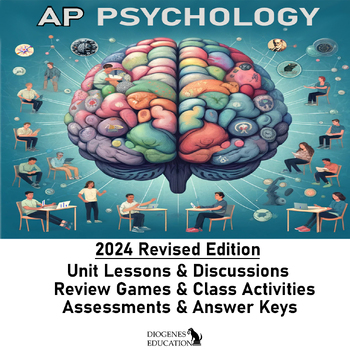AP Psychology Course | 2024 Psych Full Curriculum Bundle
- Zip
What educators are saying
Products in this Bundle (6)
showing 1-5 of 6 products
Bonus
Description
A full AP Psychology high school course updated for 2024 with FRQ MCQ and more experiment-focused design on scientific method and statistics analysis, which includes: Powerpoint presentations and lessons, activities, assessments (formative and summative), answer keys, videos, review games, a full vocabulary list with 590 words, & more!
Check out this blog for an example of what makes our course the best choice for the new FRQ-focused AP Psychology test HERE.
Introduction to Psychology
Unit 1
- The Empirical Method (Research, Experimental Design, Statistics, Ethics)
- Heredity: Nature vs Nurture.
- Nervous System and Perception (Neurons and Neurotransmitters, Weber's Law, Thresholds, Sympathetic and Paraympathetic Nervous System)
- Brain and Behavior (Brain Anatomy and Brain Plasticity).
- Sleep and Dreams.
Unit 2
- Memory (Encoding, Storage, Retrieval; Forgetting, Amnesia and Interferenc)
- Cognitive Biases and Perception
- Intelligence and IQ tests
Unit 3
- Physical Development
- Gender identity and socialization
- Cognitive Development and Language (Piaget's stages, Vygotsky, components of language and critical periods)
- Social and Moral Development (Erikson and Kohlberg, Parenting and Attachment styles)
- Developmental Psychology (Physical Development, Erikson and social development, Kohlberg and moral development, Piaget and cognitive development), Bronfenbrenner's Ecological Systems.
- Conditioning and Learning (Behaviorists: B.F. Skinner and Principles of Classical and Operant Conditioning, Bandura and Observational Learning, Other types of Learning, Reinformcements and Reinforcement Schedules).
Unit 4
- Social Psychology (Attribution theory, Conformity and Obedience, Bias, Attraction, Altriusm and Aggression, Persuasion, and more)
- Personality Theories (Psychodynamic, Social-Cognitive, and OCEAN Big-five Traits models)
- Motivation (Drive theories and more)
- Emotion (Two-Factor Theory of Emotion et al, cultural emotional displays)
Unit 5
- Clinical Psych: Perspectives on Abnormal Psychology .
- Diagnosing Disorders: "What is deviant?", DSM V, Schizophrenia, Mood disorders (Depressive and Bipolar types), Anxiety disorders (GAD, PTSD, OCD, Phobias), Personality Disorders (Cluster B), Eating Disorders and Culture Bound Syndromes, Addiction.
- Treatment: Medication and Therapy, Lifestyle changes and Support networks in the Bio-Psycho-Social model.
==============
Check out our other lessons
- Scientific Method & Stats, Ethics, and Types Studies Unit: Psych Studies
- How societal/cultural attitudes are reflected in their art: New Historicism
- Primary vs Secondary sources & Research: Media Literacy Source Analysis
- How to cite evidence for research: MLA Citations
- View our full store at: Diogenes Education TPT
- More information or contact us here: Diogenes Education
================
If you like this product, please leave a review: Not only does it help us create more great products like this, but for every review you leave you earn TpT credits toward discounts on future orders on the store!





